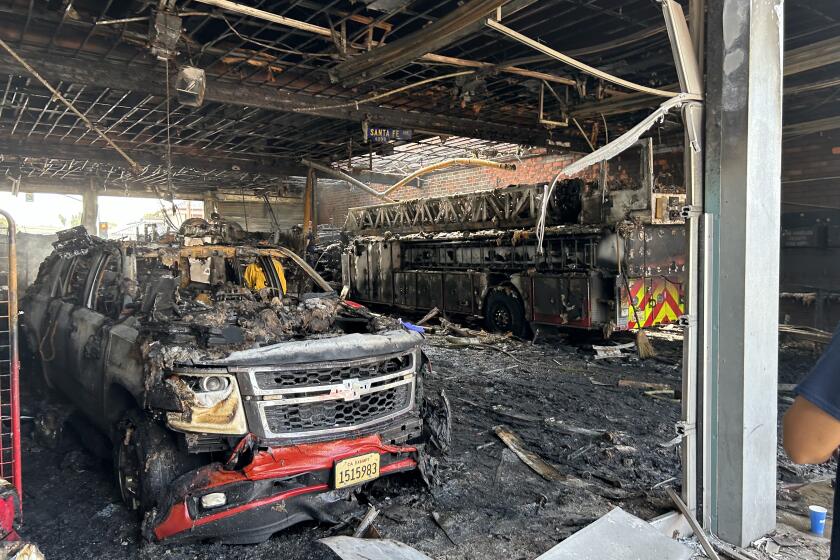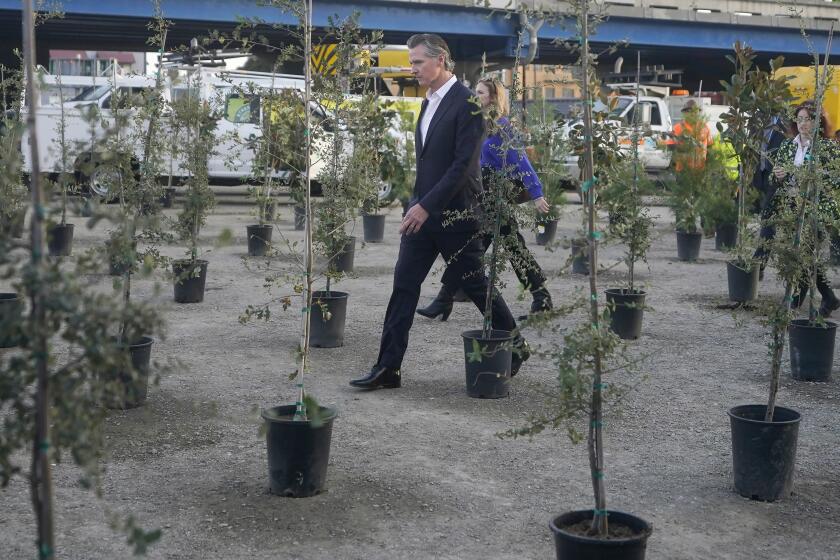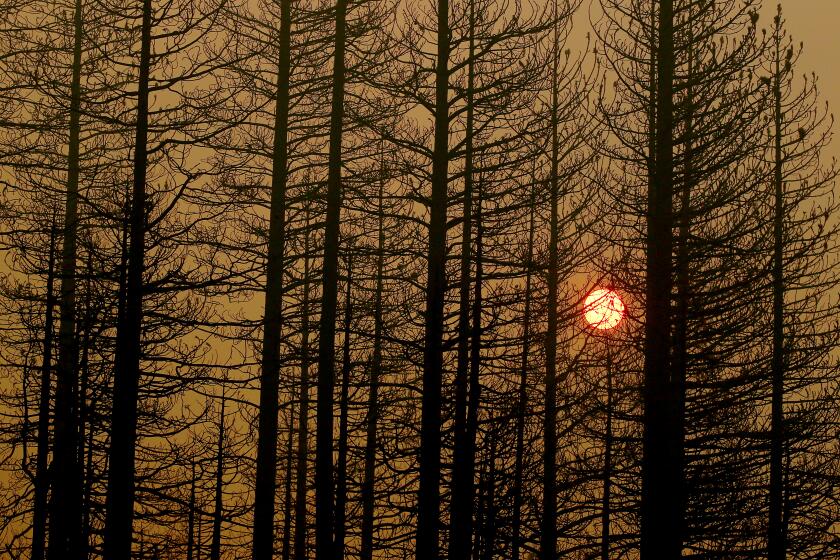Teens Get a New Start on Fire Lines
Crystal Horne has been burned before. The quarter-sized pink scars on her left forearm testify to that.
And, for a time, the 17-year-old girl with an anarchy-symbol tattoo and flame-red hair seemed destined to burn out: drinking heavily, dealing and using drugs, running from police.
But when her bad deeds landed her in juvenile prison, she found a calling that turned her stubborn energy into a saving grace:
Fighting wildfires.
Horne now leads an all-girl firefighting team of juvenile offenders from Naselle Youth Camp, in the southwestern corner of Washington state.
There, car thieves and gang-bangers learn to put axes, shovels and chain saws to good use. They plant trees, clear brush and maintain trails while training for a big wildfire to fight.
This summer, she and the other girls watched on TV as firefighters battled fierce blazes in Oregon, Colorado and other Western states -- but not in Washington. They itched to prove themselves.
“I like this,” Horne said. “It’s something I can say I did good at.”
*
The girls wake at 6:05 a.m. every weekday. Horne, her hair now faded to its natural strawberry-blond, leaves a stuffed animal on her bed and a “Chicken Soup for the Cat and Dog Lover’s Soul” on her desk.
Waiting outside their dorm after breakfast, the sleepy girls brighten as foreman Sid Hicklin ambles into view. Lanky and tan from years in the sun, Hicklin worked in law enforcement before joining the Department of Natural Resources.
Supervising the girls is unlike any other job he’s held.
“They take everything I say to heart. I can’t be so critical,” he said. “Some of their backgrounds are really devastating. You just have to build them back up.”
He has learned a lot that they don’t teach in forestry school. He knows who’s taking new medication, whose father just died, who’s in or out of the ever-shifting cliques. His daily log has such notes as, “Girls are nit picky. Told them to work without talking.”
The one thing he doesn’t know is what crimes the girls committed. He says he never asks.
When Hicklin stops the crew truck at an overgrown crossroads, the girls climb out past a blue-and-gold decal on the door with the words, “Hicklin’s Angels.”
“Let’s go,” he calls to them. “Three saws this morning.”
New girls take awhile to build the muscle needed to cut trails, saw branches and run chain saws.
“I wasn’t used to working that hard,” said Cassandra Carey, 15. “You start to get the hang of it and you start to get in shape. It starts to build your self-esteem.”
Carey has earned a blue hat, a mark of leadership, while serving time for possession of stolen property. It’s the first time that she’s felt like a leader. Following her friends got her the gang tattoo below her eye -- three dots for “mi vida loca,” my crazy life -- that she now wants removed.
“I always feel stupid because I’ve committed crimes. I feel looked down upon,” she said. “You come here and it’s like they don’t even care. You’re working so hard, your mind just is free.”
She proudly remembers the time they cleaned a cemetery for some elderly women who had been unable to do it themselves. Afterward, they thanked the girls.
“It’s fun to do good once in a while,” Carey said.
*
Washington used to have several youth rehabilitation centers like Naselle. But after years of budget cuts, Naselle is the only one left. Naselle staff is nervous about next year’s anticipated state budget crisis.
The camp has four boys’ fire crews and one for girls. Everyone else works too, whether in maintenance, the sign shop, the garden or the fish farm. After work, they go to school and counseling.
Supt. Thomas Quinn wants them to learn social responsibility. He believes it sinks in. Last winter, the 150 inmates raised $3,000 to “adopt” a local family for Christmas.
Recently, a Naselle graduate called the camp, demanding to speak to a boys’ crew foreman. Sirens wailed in the background and everyone assumed the worst.
But the boy had become an emergency medical technician; he wanted to thank the foreman.
The fire-crew program has not been without problems. In June 2001, two boys beat their foreman and left him for dead. Although severely injured, he survived. Now, security staff accompany the crews.
Generally, Hicklin trusts the girls until they give him reason not to. In return, the girls adore Hicklin. He’s like a father to them. They notice how he talks about his wife and family with obvious love.
“On the outs,” their term for outside world, “you don’t see a lot of that,” Horne said.
The girls believe that Hicklin would never put them in danger -- even if they got their wish, the chance to work on a wildfire. They’d get to leave the camp, sleep in tents and eat good food, maybe even talk to boys. They’d also get paid, although not as much as professional firefighters.
Amy Earl, a sometimes surly 17-year-old from Tacoma, loves fire crew. “I like knowing I’m saving people’s lives,” she said.
She was charged with criminal assistance to murder after her boyfriend killed a friend. The same boyfriend gave her three sexually transmitted diseases and urged her to drop out of school.
He’s serving a life sentence for murder. She believes that the fire crew put her on a different path.
“My saw breaks down, I have to fix it,” she said. “Now it’s like I’m my own woman and I don’t need anybody to make decisions for me. It’s time to realize it’s not a game any more; this is life.”
*
As summer wanes, the girls finally get their chance. On Aug. 18, they go to a 100-acre fire near Spokane -- not big by wildfire standards, but it is threatening several homes.
Some people give the crew odd looks, but the girls quickly prove themselves by extinguishing all the hot spots in their area.
“Everyone was really surprised,” Horne said. “When they realized just seven girls did all that work, they were like, ‘Wow.’ ”
As advertised, they eat well. They’re impressed by the flavored coffee creamers, which they have never seen before.
The work is tough, a lot of hauling water hoses and running up and down hills. The air is so smoky that their skin, even under their clothes, turns black and three girls get nosebleeds. But they persist.
The girls can’t talk to outsiders on a fire, but Horne appreciates when people wave or call, “Thanks!”
“It’s given me an opportunity to do what I can, to be a leader,” she said. “On that big fire, y’know, I kinda felt free a little bit. I want to keep doing that.”
More to Read
Start your day right
Sign up for Essential California for news, features and recommendations from the L.A. Times and beyond in your inbox six days a week.
You may occasionally receive promotional content from the Los Angeles Times.






